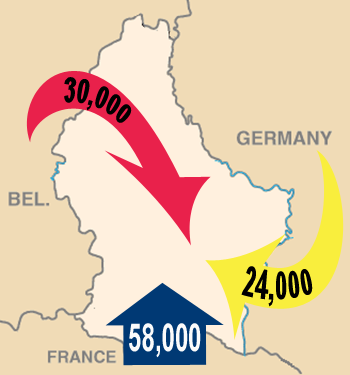Why did thousands of people come to Place Clairefontaine last Thursday? As always, there is a simple answer that glosses a complex situation.
The simple answer is that Luxembourg’s government changed the laws in a way that many consider unfair to people who work in Luxembourg but live across its borders.
Not satisfied with that?
 The full story begins decades ago, but you only really need to know one thing to get started: about 160,000 people commute from France, Belgium and Germany, to work in Luxembourg — frontaliers, as we call them. (Consider that Luxembourg has just barely 500,000 residents, including children and the retired.)
The full story begins decades ago, but you only really need to know one thing to get started: about 160,000 people commute from France, Belgium and Germany, to work in Luxembourg — frontaliers, as we call them. (Consider that Luxembourg has just barely 500,000 residents, including children and the retired.)
The worldwide recession had much less impact here than it did in the US. Still, the threat of a budget deficit led the government, this spring, to reform Luxembourg’s system of social benefits with an eye toward reducing expenditures.
One measure was Law 6148, which eliminated the government’s support for students over age 18. This program was an important part of Luxembourg’s commitment to education.
Cutting this benefit would have caused immediate unrest in Luxembourg, were it not for a simultaneous increase in the support of those same students through government grants and loans. The net effect, for Luxembourgish families, is that there is no need to change the household’s financial plans. The money comes under different names, but it still money enough to provide higher education for one’s children.
Frontaliers, however, are not eligible for the increased program of grants and loans. Thus, the net effect of Law 6148 was to take a pillar of social support, formerly universally available, and turn it into a residents-only benefit.
The Prime Minister, Jean-Claude Juncker, make a symbolic attempt to negotiate with unions and business interests (the Tripartite), but the talks broke down. It was the first time that Tripartite talks have failed in more than thirty years.
Not long after that, the unions called for protests and began organizing one against Law 6148. And according to them, last week was just the beginning.
This was written in large part from articles in the French-language newspapers L’essentiel and La Voix, and also Tageblatt.